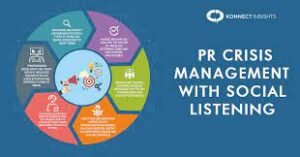[ad_1]
From PR Disasters to Triumphs: Effective Social Media Crisis Management Tips
In the current digital age, social media has become an indispensable tool for businesses to interact with their customers and expand their brand reach. However, with great power comes great responsibility. Social media platforms have the potential to amplify any misstep or mistake, leading to a public relations (PR) disaster. One wrong move can damage a brand’s reputation, result in customer backlash, and even cause financial losses. Effective social media crisis management is crucial to steer businesses out of such pitfalls and turn PR disasters into triumphs. In this article, we will explore some valuable tips for handling social media crises effectively.
1. Stay vigilant and proactive:
Prevention is better than cure. Keeping a close eye on social media platforms is essential to identify potential crises before they escalate. Establishing a strong brand monitoring system that tracks mentions, tags, and comments will help detect any emerging issues promptly. Additionally, staying ahead of trends and changes in consumer sentiment will allow businesses to address concerns in a proactive manner, enhancing their crisis management strategy.
2. Develop a crisis management plan:
Having a well-defined crisis management plan in place is critical to effectively handle any emergent situations. This plan should outline key roles, responsibilities, and protocols for handling different types of crises. Assigning dedicated resources to manage social media during a crisis is essential to ensure prompt responses, accurate information dissemination, and effective damage control.

3. Respond swiftly and sincerely:
In the midst of a social media crisis, time is of the essence. Delayed or absent responses can aggravate the situation, leading to further negative publicity. Brands must proactively respond to crises swiftly and sincerely, acknowledging the concerns raised and offering meaningful solutions. Timely response demonstrates a commitment to resolving the issue, and the sincerity portrayed can help rebuild trust and loyalty among customers.
4. Empathize and offer transparency:
During a crisis, it is essential for businesses to empathize with their affected stakeholders. Understanding their concerns and showing empathy can go a long way in diffusing tension and fostering a positive response. Moreover, businesses should strive for transparency by openly acknowledging mistakes, providing accurate information, and keeping stakeholders informed about the progress made in resolving the crisis. Transparent communication builds trust and reassures customers that the issue is being taken seriously.
5. Take the conversation offline when necessary:
Some crises warrant a more personal and private approach. In such situations, taking the conversation offline can be the most appropriate solution. Offering a direct line of communication, such as a dedicated email address or a customer service hotline, allows businesses to gather detailed information, resolve issues privately, and provide individualized solutions. This approach not only shows a commitment to customer satisfaction but also prevents further escalation on the public platform.
6. Learn from the experience:
A social media crisis should not be viewed only as a disaster but also as a learning opportunity. Analyzing the root causes of the crisis and identifying any internal or external vulnerabilities can help businesses prevent similar incidents in the future. Regularly reviewing and refining crisis management protocols, updating social media policies, and conducting employee training sessions will help strengthen the organization’s preparedness for future crises.
7. Showcase the road to recovery:
Once the crisis has been resolved, it is essential to showcase the positive steps taken and the progress made. Sharing updates on how the issue was addressed, along with any new policies or measures implemented, can help reinstate trust and demonstrate a commitment to improvement. Promoting positive customer experiences and leveraging user-generated content related to the brand can also help overshadow the negative impact of the crisis.
Stay Ahead of the Curve: Key Social Media Tools Every Marketer Must Have
In conclusion, effective social media crisis management is vital in turning PR disasters into triumphs. By staying vigilant, developing a crisis management plan, responding swiftly and sincerely, empathizing with stakeholders, offering transparency, taking conversations offline when necessary, and learning from the experience, businesses can successfully navigate through social media crises and emerge stronger than ever. The ability to effectively handle crises is a testament to a company’s resilience, adaptability, and commitment to customer satisfaction.
[ad_2]




